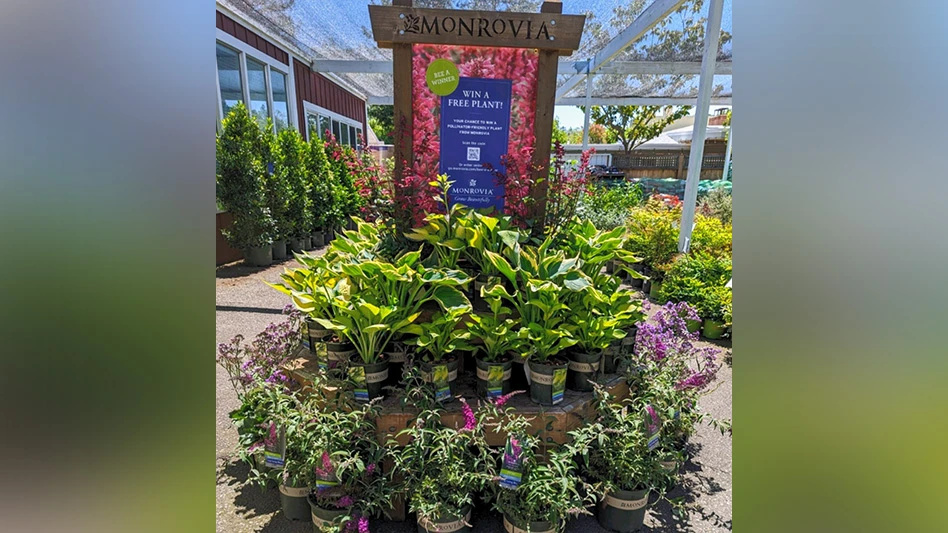

FOR SISTERS MADISON LANDA WILLIAMS and Casey Landa, life took an unexpected turn in early 2016 when their parents, Mark and Francine Landa, took them to dinner. As employees at their parents’ garden center, the sisters understood the close-knit family business’s tribulations, but they weren’t prepared for what came next. As dinner started, Mark explained that a car dealership had made an offer to buy some of their property, including the 33,000-square-foot, state-of-the-art, three-bay Nexus greenhouse that had housed their business since 2007.
To understand what was on the table that night, it helps to know the Landas’ story. The history of Boulevard Flower Gardens spans three generations of the family. Started in 1955 by Maybelle and George Landa, the original garden center sat on one acre of prime real estate on Route 1, the main thoroughfare through Colonial Heights, Va., known to locals as “The Boulevard.” With three glass greenhouses built by 1956, the Landas made a name retailing houseplants and seasonal bedding plants.
By 1982, Maybelle and George’s son Mark and his wife, Francine, took over and diversified. A florist, nursery stock, perennials, landscaping and water gardening were added to the mix. By 2005, Boulevard Flower Gardens hit $3.25 million in sales. Business was so brisk on that one-acre site — and the parking lot so small — that senior-day fender benders became regular occurrences. The city’s reluctance to allow major renovations at the site complicated the Landas’ plans for growth.
Like many IGC owners before and since, Mark and Francine decided it was time to make their move. Twenty years earlier, they had purchased 72 acres and established their production greenhouses just 3.5 miles and one turn away. On Ruffin Mill Road in neighboring Chesterfield, the property seemed ideal for a new building and continued growth. As Mark recalls, “We said, ‘Let’s see if we can’t just do it all.’ We built this grand facility — 33,000 square feet, open-roof greenhouses and garden center, offices and café — the whole nine yards.”
Boulevard Flower Gardens at Ruffin Mill opened on a high note in 2007, but then the recession hit. Anticipated sales growth never materialized, though mortgage payments and operating expenses multiplied five-fold. Despite the best laid plans from leading industry consultants, Boulevard’s downward trend simply wouldn’t turn. By the time Mark, Francine and their daughters sat down for dinner, the garden center had endured a steady decline in sales of 10 percent annually.

Deciding to start anew and reclaim a past
As Mark and Francine shared the purchase offer with their daughters, they also presented the opportunities they saw. Mark reiterated their troubles, but acknowledged the business’s upsides as well. Unlike many IGC owners with similar troubles, the Landas had a chance to recoup their investment and walk away, but they also had an opportunity to claim their future and reclaim their roots. “My dad said, ‘If you want to get out, this is your chance. But if this is your passion, now’s your chance as well,’” Casey recalls.
Mark didn’t ask for a decision, but Madison and Casey knew their answer. “For Casey and I, I think we never pictured ourselves doing anything else,” Madison says. “We sat through that dinner and I told him that I didn’t really know what [the business’s future] would look like, but I wasn’t ready for it to end.” The family set their sights on a new plan, a new vision and a new building for Boulevard Flower Gardens. “So, we started from there,” Madison says.
The purchase offer was accepted, with generous allowances for time. Madison and Casey grabbed the reins and their vision for the future took form. As this issue goes to press, their new 6,000-square-foot, double-greenhouse facility is about to open on their remaining acreage at the rear of the Ruffin Mill property. Close by are the 13 production greenhouses where Mark plans to grow “for the girls.” By design, the new store feels a lot like the original garden center on The Boulevard that Madison, Casey and many of their customers have missed.
Recreating the feeling they remember from their grandmother’s store has been a driving factor in the transition. “People in the community are very nostalgic about that building and that shopping experience. I have missed that since we moved [to Ruffin Mill],” Madison says. “We’re going back to something more manageable with that homey feeling. That’s what our family needs and that’s how we thrive best in a business sense.”







Moving forward with a new vision and focus
With many big-box and smaller retailers downsizing to stay afloat, it may seem like the Landas are doing the same. But that’s not quite how Madison sees it. “We are physically downsizing, but this move is more about simplifying and focusing. From the beginning, we’ve always grown and nurtured plants,” she says. “We’ve reevaluated and refocused on that passion. As it turns out, we’re just able to do that on a smaller footprint.”
As this generational transition took shape, product categories that didn’t hold their own were cut. Both Madison and Casey express the feeling that pressure to fill the larger facility spread the family too thin and provided too many confusing options for their core customers. As they dug into the numbers and refined their focus, an onsite café and a home décor department were among the first to go. “Now we are going to be one selling environment, all about the garden and the landscape and creating that outdoor living space, rather than getting into a separate sort of business,” Madison explains.
“People in the community are very nostalgic about [the original, smaller Boulevard Flower Gardens building] and that shopping experience ... We’re going back to something more manageable with that homey feeling.” — Madison Landa Williams
Personal passions are driving the future, but nothing trumps the bottom line. “It really is a numbers thing,” Casey shares. “You can’t operate with things that don’t sell. Even though you may not like it, you may have to carry it — and even though you really like it, you may have to cut it out.”
Fortunately for the family, their primary passion coincides with their most profitable segments and their business plan. “We’re looking forward to having a smaller facility because we can actually focus back on the plant material,” Casey says. “That’s what our business has been known for. That’s what sells, and that’s what we’re good at.”



Creating a new rhythm and reality
With more than a year of planning and preparation behind them, Madison and Casey have found that their sisterly “yin and yang” fits perfectly with their new roles. Casey, like her father, loves growing and being with customers and plants on the sales floor. She’s also taken on Boulevard’s social media accounts. Her sister naturally gravitates to back-office support, including the accounting and marketing roles her mother has filled in the past.
A new POS system to remedy a perpetual weakness in inventory control was among Madison’s first moves. Next was a website upgrade to sell plant material online, something that’s already yielding sales, much to Mark’s surprise. Their thriving floral department, complete with delivery vehicles, is now linked to their own website instead of Teleflora, a service they used in the past. The addition of plants for in-store pickup or local delivery was an obvious step, one Madison feels holds big promise for the future.
Though Madison and Casey’s ages qualify them as Millennials, their vision transcends any single generation. “I think [our age] is helpful, as we try and reel in a generation that doesn’t come to gardening as naturally as older generations did, but we also look at the past 60 years,” Madison says. “It’s got to be a blend, because our customer base is so mixed. We really do have to be creative and market that, and research that, and provide for that.”





Preparing for the first of many springs
As a refocused, reinvented Boulevard Flower Gardens faces its first spring, a key group of employees are being trained across departments for a cohesive operation in preparation for what’s ahead. A few long-term employees retired last year, and others went part-time, easing any pressure to let devoted, long-term employees go.
“The key people we lost were replaced with people that could walk right into their place,” Mark says. “Instead of 30 full-time workers, we’ll have more like five to seven, with the rest part-time.” Seasonal employees will be hired, as they’ve always been, and one staff member will be noticeably absent for a time. Madison is expecting the birth of her second child in April — timing that prompts a confident, loving laugh from her sister.
Mark is settling into his new production greenhouse office space. Production numbers overall will be very similar to past years, but sizes have been streamlined to focus on those that sell best.
That change carries through fertilizer, houseplants, perennials, nursery stock and more. As the transition nears completion, Francine eagerly awaits cutting back, semi-retiring, and shifting her focus to babysitting.
As they face the future as a business and as a family, Madison and Casey seem free of illusions about what’s ahead. “We knew it was going to be a challenging road to simplify and downsize,” Casey says. “But I think we all, including our staff, understand this was the best decision we could make with the opportunity that we were blessed with — for our family, ourselves, the community and our staff.” As Madison adds, “Bigger’s not always the better picture. This is the best family and business decision we could make.”

Explore the February 2018 Issue
Check out more from this issue and find your next story to read.
Latest from Garden Center
- This Florida garden center's busiest days are in the fall, not spring. Find out how they do it
- Terra Nova Nurseries releases new agastache variety, 'Peach Pearl'
- The Certified Shopify Online Garden Center provides local retailers with ecommerce tool
- Meet the All-America Selections AAS winners for 2025
- Endless Summer hydrangeas and Suntory Senetti glam up Grammys red carpet
- Ball Seed releases 2025 edition of 'Thrive and Flourish' for landscape and garden retail
- American Floral Endowment's Fred C. Gloeckner Foundation Research Fund accepting grant proposals
- Floral Marketing Fund and CalFlowers partner to advance floral industry





